How to Break Bad Habits: 10 Science-Backed Methods

Breaking a bad habit takes an average of 66 days, according to research. But the timeline varies widely based on the habit type, your neurobiology, and your approach. The most effective strategies combine brain science with practical daily actions that disrupt the automatic behavior loop.
This guide covers 10 proven techniques backed by recent neuroscience research from 2024-2025. You’ll learn exactly how habits form, why they’re hard to quit, and which method works best for your situation.
The most successful approach involves three core actions. First, identify the cue that triggers your habit. Second, replace the routine with a healthier behavior that provides similar rewards. Third, change your environment to remove triggers you can’t avoid through willpower alone.
Cold turkey works better than gradual reduction for many habits. Smokers who quit abruptly are 25% more successful than those who cut down slowly. However, your individual neurobiology matters. Some people respond better to gradual changes depending on their brain chemistry and stress response.
Track your progress daily for at least 66 days. Research shows this average timeframe allows new automatic behaviors to form. But don’t expect perfection. The actual range spans 18 to 254 days depending on habit complexity and personal factors.
Understanding How Habits Form in Your Brain
Your brain creates habits to save energy and mental resources. When you repeat a behavior consistently, neural pathways strengthen. Eventually, the behavior becomes automatic and requires almost no conscious thought.
Two competing brain systems control your behavior. The goal-directed system handles conscious decisions and planning. The habitual system runs automatic routines triggered by environmental cues.
Bad habits dominate when the habitual system overrides your conscious intentions.
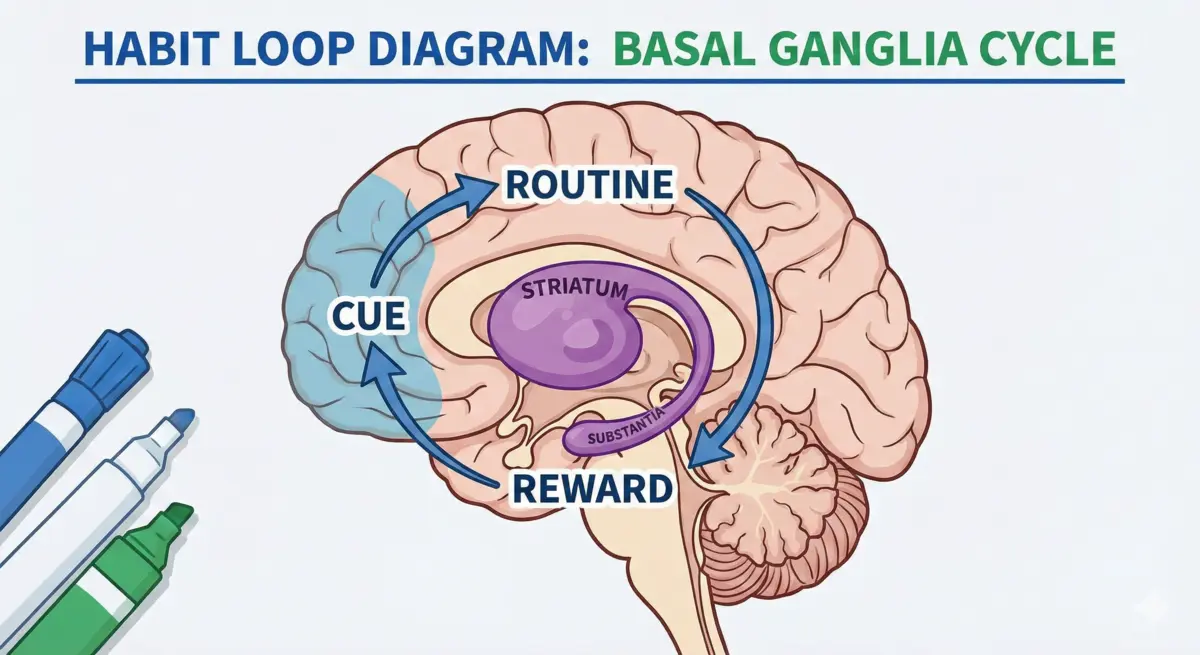
The Habit Loop: Cue, Routine, Reward
Every habit follows a three-part loop. The cue triggers the behavior (seeing your phone). The routine is the action itself (scrolling social media). The reward is what your brain gains (dopamine release, boredom relief, social connection).
Your brain doesn’t distinguish between good and bad habits. It simply repeats behaviors that provided rewards in the past. This explains why you reach for cigarettes during stress or check your phone every few minutes without thinking.
Breaking the loop requires interrupting at least one of these three stages. You can eliminate cues, replace routines, or find alternative rewards. The most effective approaches target multiple stages simultaneously.
Why Bad Habits Feel So Hard to Quit
Dopamine plays a central role in habit formation. This neurotransmitter creates the motivation to repeat behaviors, not just the pleasure from them. Your brain learns to anticipate rewards and triggers cravings before you even perform the habit.
Stress strengthens habitual behavior. When you’re tired, anxious, or overwhelmed, your brain defaults to automatic routines. This explains why bad habits return during difficult periods, even after weeks of progress.
Environmental cues trigger habits without conscious awareness. Your brain associates specific contexts with specific behaviors. Walking past a vending machine, opening your laptop, or feeling bored all activate automatic habit routines stored in your neural pathways.
How Long Does It Take to Break a Bad Habit?
The popular 21-day myth is inaccurate and sets unrealistic expectations. This misconception originated from a plastic surgeon’s observations in the 1960s, not from controlled research.
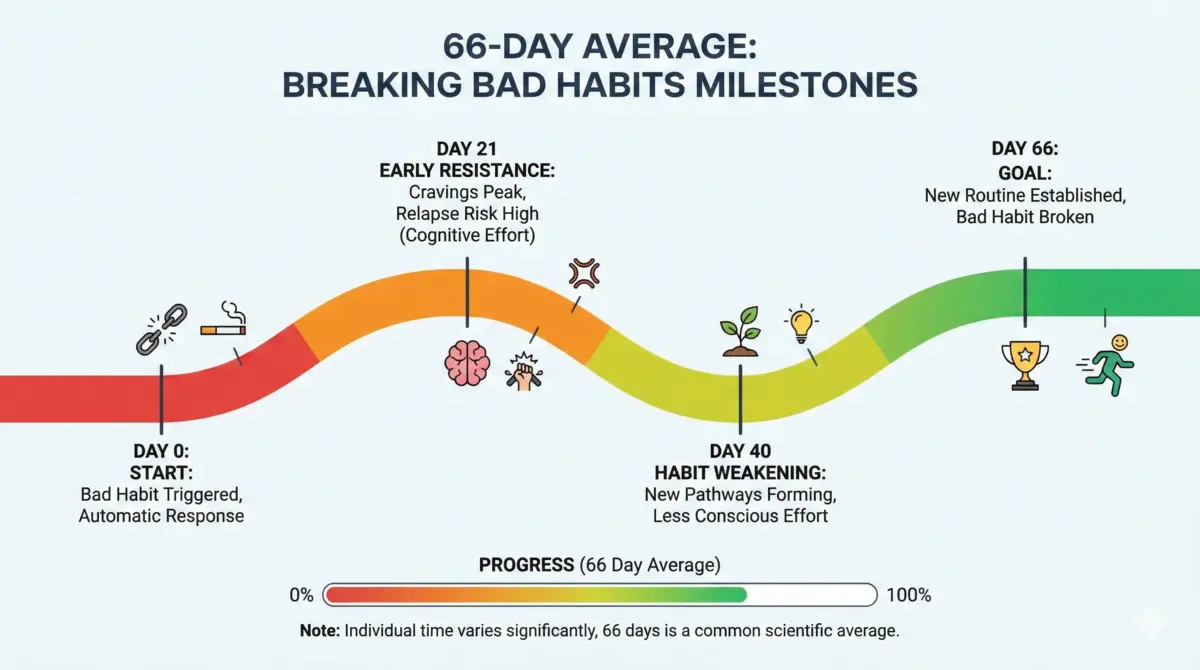
The Real Timeline: 18 to 254 Days
A 2009 study tracked 96 adults forming new habits. One participant succeeded in just 18 days. But most people needed much longer. The average time for a new behavior to become automatic was 66 days.
The range extends to 254 days for complex habits. Habit difficulty, frequency, and personal factors all influence the timeline. Your neurobiology, stress levels, environment, and support system accelerate or slow progress.
Expect the first 30 days to feel hardest. Your brain actively resists change during this period. Cravings peak in weeks two and three for most habits. After 60-70 days, the new behavior starts feeling more natural and requires less conscious effort.
Different Habits Require Different Timeframes
Simple habits break faster than complex ones. Changing your coffee order takes less time than quitting smoking. Habits tied to strong emotional needs or addiction require longer timelines and often professional support.
Here’s a realistic breakdown for common habit types:
Low-complexity habits (nail biting, snacking, checking phone): 30-90 days with consistent effort. These respond well to awareness and substitution techniques.
Medium-complexity habits (procrastination, oversleeping, overeating): 60-150 days. These often have emotional triggers that need separate attention.
High-complexity habits (smoking, alcohol use, substance dependence): 90-254+ days. These involve physical dependence and may require medical support, therapy, or clinical intervention.
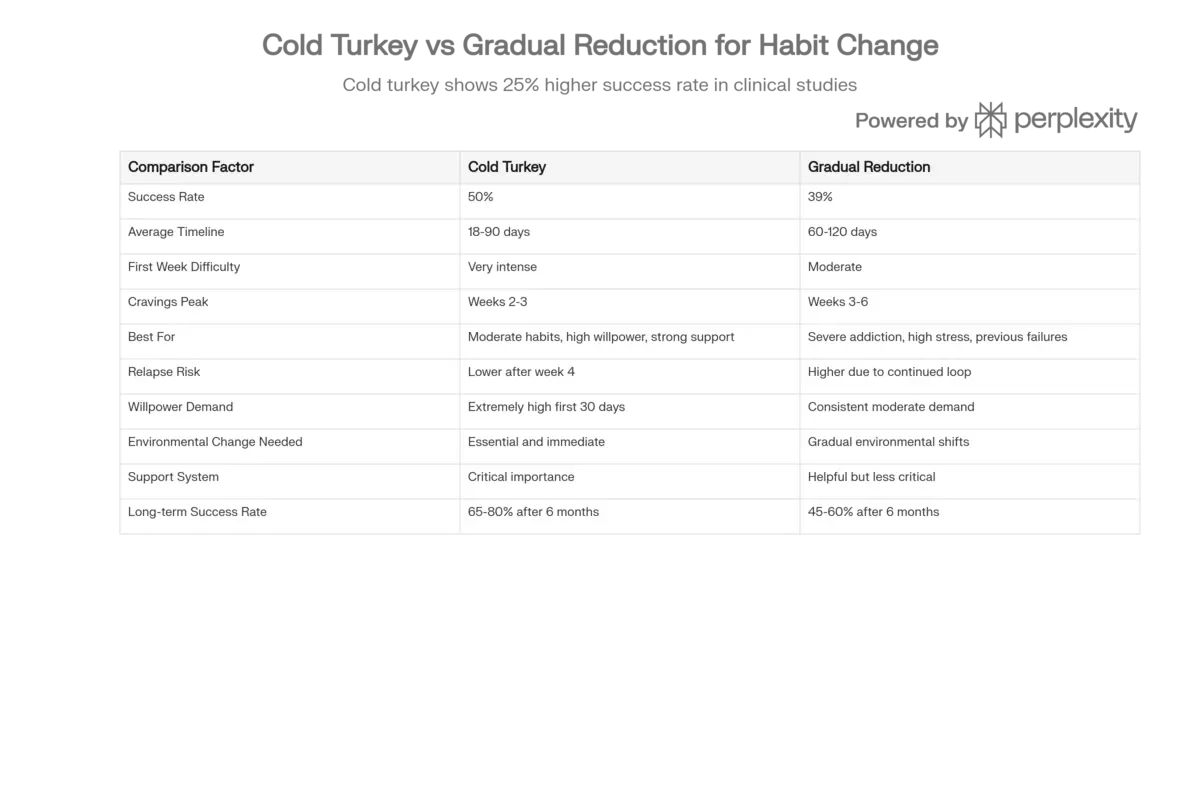
Cold Turkey vs. Gradual Reduction: Which Works Better?
Cold turkey outperforms gradual reduction for most people. In a British Heart Foundation study of 697 smokers, 50% of cold turkey quitters succeeded versus only 39% of gradual reducers. That’s a 25% higher success rate for abrupt cessation.
The psychology explains why. Gradual reduction keeps you in the habit loop longer. Every cigarette or indulgent behavior reinforces the neural pathway you’re trying to weaken. Cold turkey breaks the pattern completely and accelerates the rewiring process.
However, your neurobiology matters more than general statistics. Recent 2024 research from Trinity College Dublin shows that individual brain chemistry affects which approach works better. Some people tolerate abrupt change well. Others experience severe stress that triggers relapse.
Choose cold turkey if: Your habit is moderate-intensity, you have strong willpower reserves, you respond well to challenges, and you have a solid support system ready. This works best for habits without severe physical dependence.
Choose gradual reduction if: Your habit involves physical addiction, you have high stress levels, you’ve failed multiple cold turkey attempts, or you need time to build replacement behaviors. This approach reduces shock and builds confidence through small wins.
Hybrid approach: Some experts recommend a two-week gradual reduction followed by complete cessation. This gives you time to prepare support systems while still breaking the loop definitively.
10 Proven Techniques to Break Bad Habits Permanently
1. Map Your Habit Loop to Find Breaking Points
Identify your specific cue, routine, and reward. Spend one week tracking when the habit occurs. Note the time, location, emotional state, people present, and what happened immediately before.
Write down the reward your brain seeks. Are you avoiding boredom? Reducing stress? Seeking social connection? Getting an energy boost? Understanding the true reward helps you find better alternatives that satisfy the same need.
Find your weakest link in the loop. Cues are often easiest to eliminate. If you always smoke with coffee, switch to tea. If you overeat while watching TV, eat only at the table. Small environmental changes disrupt automatic patterns.
Discover Your Inner Self. Join Our Self-Mastery Program.
Self-Mastery Coaching gives you the space, tools, and guidance to grow, reflect and discover your values and inner strength.

2. Identify and Eliminate Environmental Triggers
Your surroundings drive 40-50% of your daily behaviors. Environmental cues activate habits without conscious thought. Removing triggers proves more effective than relying on willpower.
Remove physical cues from your space. Delete apps from your phone. Throw away junk food. Hide your credit cards. Remove cigarettes and alcohol from your home. Make the bad habit harder to perform by adding friction.
Change routines that lead to triggers. Take a different route home to avoid the convenience store. Work in a library instead of a cafe. Rearrange your furniture to break location-based habits. Your brain associates contexts with behaviors.
Use implementation intentions to handle unavoidable triggers. Research shows that if-then plans significantly improve habit change success. These pre-planned responses override automatic reactions when you encounter cues.
3. Replace the Bad Habit with a Healthy Alternative
Your brain needs a substitute behavior that provides similar rewards. Empty voids rarely stay empty. Without a replacement, your old habit rushes back during stress or boredom.
Match the reward type to your original habit. If smoking gave you breaks from work, schedule five-minute walks instead. If social media provided connection, call a friend. If sugar provides energy, try fruit or protein.
Make the replacement as easy as the bad habit. If the new behavior requires too much effort, you’ll revert to automatic patterns under stress. Reduce friction for good habits while increasing it for bad ones.
Practice the replacement behavior in the same contexts as the old habit. This helps your brain form new associations between cues and routines. Repetition in consistent environments accelerates the rewiring process.
4. Use If-Then Plans for Automatic Responses
Implementation intentions give your brain pre-programmed responses to triggers. The format is simple: “If X situation occurs, then I will do Y behavior”. This technique emerged from 2024 neuroscience research as highly effective.
Create specific plans for high-risk situations. “If I feel stressed at work, then I will take three deep breaths and drink water.” “If I see dessert at dinner, then I will order herbal tea instead.” Specificity matters more than quantity.
Write your if-then plans down. The act of writing strengthens neural commitment. Keep the list visible on your phone or desk. Review it daily for the first 30 days until the responses become automatic.
Stack multiple if-then plans for complex habits. You’ll need different responses for different triggers. Create a plan for morning triggers, afternoon triggers, social situations, and stress responses. Cover your most common high-risk moments first.
5. Track Your Progress Daily for Accountability
Daily tracking increases success rates significantly. Visual progress builds motivation and makes your effort concrete. You gain awareness of patterns you’d otherwise miss.
Use a simple calendar or app. Mark each day you avoid the bad habit with an X. Watching the chain grow creates psychological momentum. You won’t want to break the streak after 10 or 20 consecutive days.
Track context along with success and failure. Note what triggered any lapses. Record your emotional state, stress level, sleep quality, and circumstances. This data reveals your personal risk factors and helps you refine your strategy.
Review your tracking weekly. Look for patterns in successful days versus difficult ones. Adjust your approach based on what the data shows. Maybe you struggle on weekends, or after poor sleep, or in social settings. Address your specific vulnerabilities.
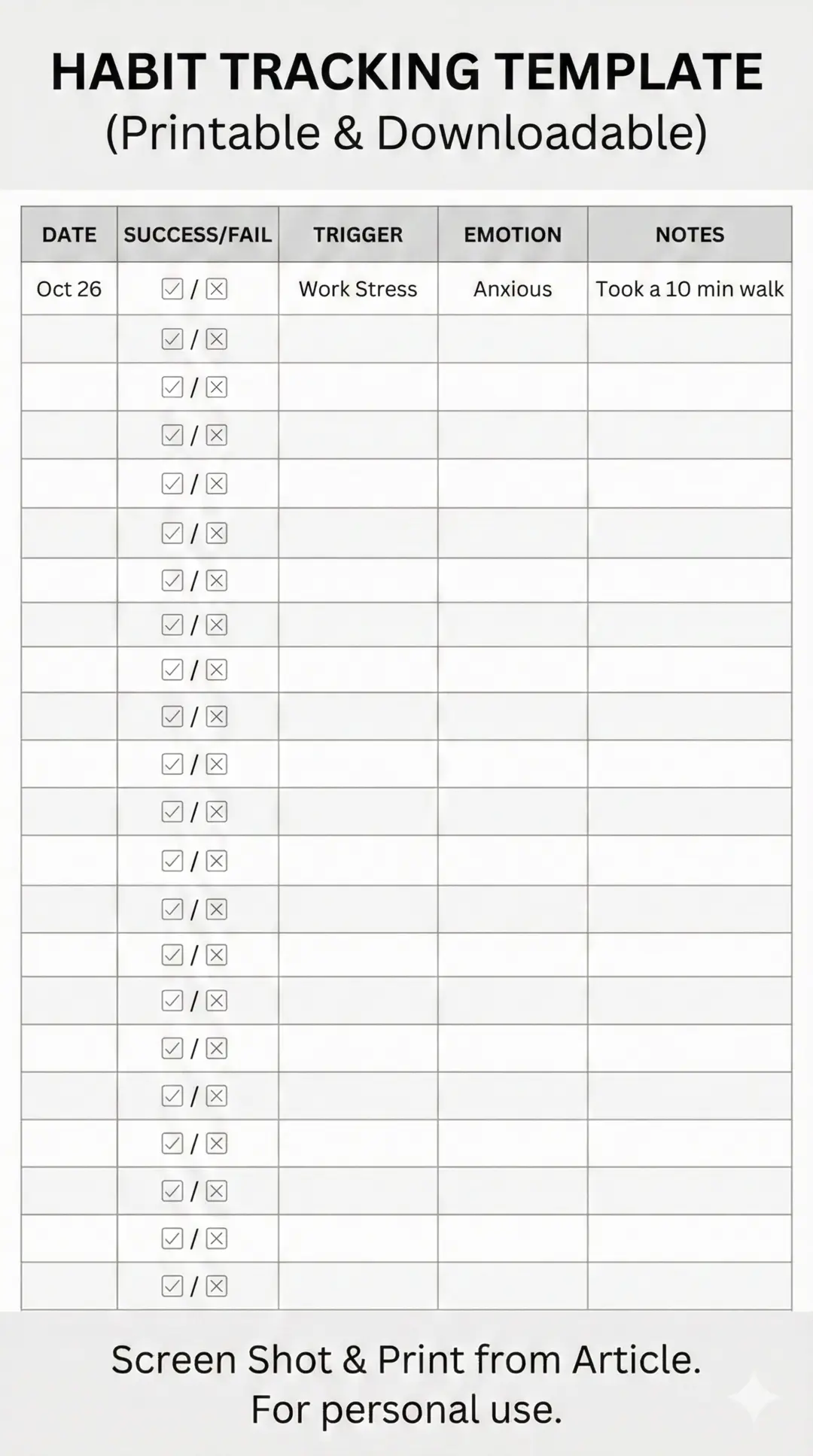
6. Build a Support System Around Your Goal
People who announce their goals and recruit support succeed more often. Accountability to others activates different motivation systems than private commitment.
Tell three to five people about your specific goal. Choose people who will check in regularly and genuinely care about your success. Avoid those who enable the bad habit or dismiss your effort.
Find or create an accountability partner. Someone attempting a similar change makes an ideal partner. Schedule weekly check-ins to share progress, challenges, and strategies. The mutual commitment strengthens both people’s resolve.
Join groups focused on your specific habit change. Online communities, local support groups, or therapy groups provide shared experience. You’ll gain practical tips from people ahead of you in the process. You’ll also help others, which reinforces your own commitment.
Consider professional support for difficult habits. Therapists trained in habit reversal therapy, cognitive behavioral therapy, or addiction counseling offer evidence-based interventions. They customize approaches to your neurobiology and circumstances.
7. Address Stress and Emotional Triggers First
Stress is the primary cause of habit relapse. When your brain feels overwhelmed, it defaults to automatic behaviors regardless of your intentions. Managing stress proves as important as targeting the habit directly.
Identify your emotional triggers. Do you overeat when anxious? Smoke when angry? Procrastinate when overwhelmed? The habit is often a coping mechanism for uncomfortable feelings. Treating symptoms without addressing root causes leads to relapse.
Build alternative stress management tools. Practice meditation, exercise, journaling, or therapy. Develop these before you need them. When stress hits, you’ll have functional coping skills ready instead of reverting to a bad habit.
Reduce overall stress during the first 60 days. This isn’t the time to start three new habits or take on major projects. Give your brain the capacity to manage the habit change. Lower your other demands temporarily if possible.
8. Practice Habit Reversal Therapy Techniques
Habit reversal therapy is a clinical intervention with strong research support. It combines awareness training with competing response practice. You can apply core techniques on your own for many habits.
Increase awareness of the habit action. Many bad habits occur unconsciously. Notice the exact moment you start the behavior. Some people snap a rubber band or say “stop” out loud to interrupt the automatic pattern.
Develop a competing response. This is a behavior that physically prevents the habit. For nail biting, clench your fists or sit on your hands. For hair pulling, grip a stress ball. The competing response must be incompatible with the bad habit.
Practice the competing response immediately when you notice the urge. Hold it for at least one minute until the craving passes. This teaches your brain a new automatic response to the trigger. With repetition, the competing response becomes the new habit.
9. Change Your Environment to Support New Behavior
Environmental design outperforms willpower for long-term success. A 2018 review found that changing surroundings predicts habit change better than motivation alone.
Make bad habits harder and good habits easier. This is called friction design. Add steps between you and the bad habit. Remove steps between you and the replacement behavior. Physical and time barriers matter more than you expect.
Redesign your spaces around your goal. If you want to stop late-night snacking, don’t stock snack foods. If you want to stop scrolling before bed, charge your phone in another room. Your environment should guide you toward success automatically.
Create visible reminders of your goal. Use Post-it notes in trigger locations. Change your phone wallpaper to a reminder image. Place your tracking calendar where you’ll see it multiple times daily. Environmental cues can support good habits just as they trigger bad ones.
According to 2024 research, personalizing your environment based on your specific neurobiology increases success rates. Some people need more cue removal. Others benefit more from extra time in routines. Test different approaches and optimize for your brain’s response.

10. Expect Setbacks and Plan Your Comeback
Perfection is not the goal or the reality. Research shows that most people experience multiple lapses during habit change. How you respond to setbacks matters more than avoiding them completely.
Distinguish between a lapse and a relapse. A lapse is one instance of the old behavior. A relapse is returning to the pattern fully. One cigarette doesn’t erase 30 days of progress unless you use it as permission to quit trying.
Create a setback recovery plan before you need it. Write down exactly what you’ll do after a lapse. Maybe you’ll call your accountability partner. Maybe you’ll review your if-then plans. Maybe you’ll journal about the trigger. Having a plan prevents the shame spiral that leads to full relapse.
Analyze each setback for data. What was the trigger? What was your emotional state? What could you do differently next time? Setbacks reveal vulnerabilities in your strategy. Use them to strengthen your approach rather than as evidence that you can’t succeed.
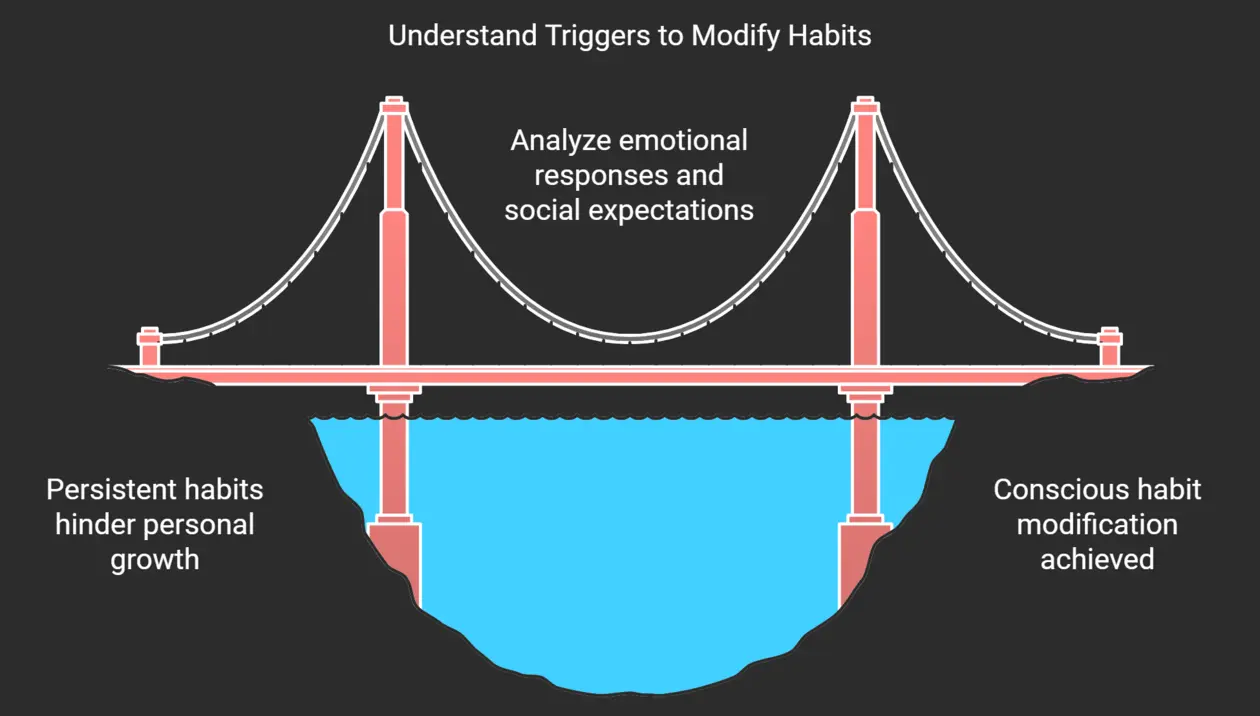
Common Mistakes That Keep You Stuck
Many people fail not because habits are impossible to break, but because they use ineffective strategies. Avoid these common errors.
Relying on willpower alone. Willpower depletes throughout the day. Environmental design and if-then plans work when willpower fails.
Trying to break multiple habits simultaneously. Your brain has a limited capacity for change. Focus on one habit at a time. After 66 days, add another if desired.
Not identifying the true reward. If you don’t understand what your brain gains from the habit, your replacement won’t satisfy the same need. This guarantees relapse.
Expecting linear progress. Habit change looks like a bumpy upward trend, not a straight line. Some days feel easy, others feel impossible. This variation is normal.
Keeping the same environment. If all your triggers remain in place, you’re fighting your surroundings constantly. Change your environment first, then work on internal changes.
Giving up after one setback. The average successful habit changer experiences 5-7 lapses before permanent change. Persistence through imperfection wins.
Using the 21-day myth as your timeline. When change doesn’t happen in three weeks, people assume they’ve failed. The real average is 66 days, and many habits take longer.
When to Seek Professional Help
Some habits require expert intervention. Recognize when self-help reaches its limits.
Signs you need professional support: Physical withdrawal symptoms, inability to stop despite serious consequences, multiple failed attempts using proven techniques, the habit dominates your thoughts and time, and you experience depression or anxiety alongside the habit.
Effective clinical interventions include: Cognitive behavioral therapy, habit reversal therapy, exposure therapy, contingency management, and, in some cases, brain stimulation techniques.
These evidence-based treatments target the neurological and psychological mechanisms maintaining your habit.
Addiction differs from habit. If your behavior involves substance dependence or compulsive disorder symptoms, clinical treatment becomes essential. Therapy, medication, and structured programs offer better outcomes than willpower alone for addiction.
Don’t view professional help as failure. Complex habits reflect complex brain systems. Getting expert support shows commitment to success, not weakness.
- Breaking a habit takes an average of 66 days, with a range of 18 to 254 days depending on complexity and individual factors.
- Cold turkey works better than gradual reduction for most people, with 25% higher success rates.
- Your environment drives behavior more than willpower, so eliminate triggers and redesign your spaces.
- Use if-then plans to create automatic responses to high-risk situations.
- Track daily progress, expect setbacks, and focus on one habit at a time for best results.
Subscribe to Create Higher Vibrations!
Get Inspiration and Practical advice straight to your inbox.


